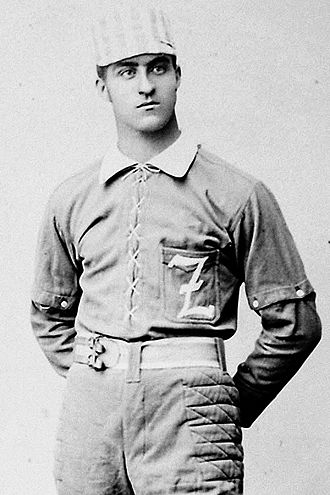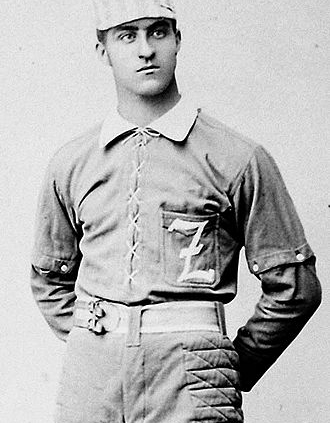June 19, 1890: Billy Gumbert’s arm and bat propel Pittsburgh to win in his major-league debut
 On their way to an abysmal 23-112-2 (.169) last-place finish in the 1890 National League pennant chase, the Pittsburgh Alleghenys auditioned no fewer than 20 different starting pitchers. On June 19 player-manager Guy Hecker handed the ball to new arrival Billy Gumbert, a 24-year-old righty just recruited from the local amateur league ranks. The prospect had little pitching experience, having made his first appearance in the box only the summer before. Prior to that Gumbert had been a shortstop. But the Alleghenys were desperate and Gumbert was a hometown Pittsburgh lad with a local following. He had an imposing size (6-feet-1½, 200 pounds) and good DNA, as he was the older brother of budding pitching star Ad Gumbert, who was already a proven major-league winner.1 And only two days earlier, Billy had impressed in an exhibition game, holding a picked nine captained by Pittsburgh skipper Hecker to five hits in a 2-1 loss.2
On their way to an abysmal 23-112-2 (.169) last-place finish in the 1890 National League pennant chase, the Pittsburgh Alleghenys auditioned no fewer than 20 different starting pitchers. On June 19 player-manager Guy Hecker handed the ball to new arrival Billy Gumbert, a 24-year-old righty just recruited from the local amateur league ranks. The prospect had little pitching experience, having made his first appearance in the box only the summer before. Prior to that Gumbert had been a shortstop. But the Alleghenys were desperate and Gumbert was a hometown Pittsburgh lad with a local following. He had an imposing size (6-feet-1½, 200 pounds) and good DNA, as he was the older brother of budding pitching star Ad Gumbert, who was already a proven major-league winner.1 And only two days earlier, Billy had impressed in an exhibition game, holding a picked nine captained by Pittsburgh skipper Hecker to five hits in a 2-1 loss.2
With some 1,267 fans in attendance at Pittsburgh’s Recreation Park,3 Gumbert started the opener of a doubleheader against the Cleveland Spiders. He proved to be the star of a much-needed Alleghenys triumph, 9-2. The newcomer handcuffed the Cleveland bats, throwing a complete-game three-hitter. Billy also provided the game’s offensive highlight. In his first official at-bat, Gumbert hit a two-run homer, becoming the first player in National League history to begin his major-league batting career with a home run.4
Homestanding Pittsburgh elected to bat first but was held scoreless in the initial frame by Cleveland rookie right-hander Jack Wadsworth. Betraying no outward signs of jitters, Gumbert returned the compliment, setting down the Spiders in the bottom of the first. In the second, the Pittsburgh offense erupted for five runs. Third baseman Fred Roat ignited the outburst with a double to left, and skipper Hecker drove him in with a single, taking second on the throw home. Hecker soon advanced to third on a wild pitch. He remained there when Wadsworth walked Allegheny outfielder John Kelty and thereafter scored the second Allegheny run on shortstop Sam Crane’s base hit. That brought pitcher Gumbert to the plate with runners on first and second. A successful sacrifice bunt promptly moved the runners up a base. A single by right fielder Doggie Miller then got both runners home, with Miller taking second on a futile throw to the plate. He eventually came around, scoring Pittsburgh’s fifth run on another Wadsworth wild pitch.
In the bottom of the third, Cleveland got on the scoreboard. Gumbert hit his opposite number with a pitch, after which consecutive sacrifices placed Wadsworth on third. Cleveland’s first hit of the game, a double by Peek-a-Boo Veach, brought Wadsworth in. The Alleghenys immediately recouped their five-run lead with a tally in the fourth. Crane doubled, Gumbert again sacrificed, and a single by center fielder Billy Sunday made the score 6-1. In the last of the fourth, a double by Cleveland catcher Chief Zimmer, a sacrifice, and a miscue by shortstop Crane gifted the Spiders an unearned run. It would be their last of the contest.
In the top of the sixth, a single by Kelty brought Gumbert to the plate with one out. Having sacrificed his initial two times at the plate, he remained without an official big-league at-bat. And once again, he came to bat in a sacrifice situation. But manager Hecker decided to let Billy hit away. The righty-swinging Gumbert responded with a long drive to left-center that the swift-footed pitcher5 converted into an inside-the-park home run. The blast, while surely welcomed by Pittsburgh, was hardly a total surprise. Gumbert was a solid-hitting former position player who had socked a homer and a triple off then-Pittsburgh ace Pud Galvin in an exhibition game two years earlier.6 Still, Gumbert’s four-bagger was a record-setter, the first home run ever hit by a National League player in his first major-league at-bat.
From there Gumbert coasted home, allowing only a single by Zimmer over the final four innings. In his route-going 9-2 victory, he held the Spiders to a mere three hits, striking out two while walking a like number. Unhappily for Pittsburgh, the result did not repeat itself in the nightcap of the twin bill. Fellow recruit George Ziegler lasted only six innings in a 7-1 beating of the Alleghenys.7 The contest was pitcher Ziegler’s only appearance as a major leaguer, as he was released shortly thereafter. But Cleveland was anxious to retain first-game hurler Gumbert, from whom more good work could be expected.
Nineteenth-century baseball scholar David Nemec has speculated that “Billy Gumbert may have been more talented than his younger brother Ad,” a 123-game major-league winner.8 But while close as brothers, the two had very different ambitions. At least during his early years, Ad Gumbert was willing to sublimate advancement in the various local government posts that he held in order to play baseball.9 Billy was not so inclined. He landed a promising position in the bookkeeping department of a Pittsburgh steel products manufacturer and was loath to travel far from the home office. Fortunately for Pittsburgh, Gumbert’s employer was a baseball fan and willing to make the pitcher available – but on a home-game-only basis. For the remainder of the season, Billy went to the office every morning and would head for the ballpark in the early afternoon if he received a “come over and pitch” telephone call from the Alleghenys.10
Because attendance at Recreation Park was so meager – an April contest against Cleveland attracted only six paying patrons (out of 17 spectators in attendance, total), the all-time major-league single-game turnstiles nadir11 – the Alleghenys switched many scheduled home dates to away games.12 As a result, Billy was used only 10 times that summer. He finished the season with a substandard 4-6 record, but his .400 winning percentage was easily the highest of any Allegheny pitcher with double-figure game appearances.
Despite his potential, only a handful of major-league games lay in Billy Gumbert’s future. He preferred to devote his working life to business pursuits. But for the remainder of his years – and Gumbert lived to be 80 – he would always recall fondly the afternoon of June 19, 1890 at Recreation Park.
Sources
No play-by-play for the subject-matter game was discovered. The sources for the narrative above are specified in the endnotes.
Notes
1 Ad Gumbert had posted a 16-13 record for the NL Chicago White Stockings in 1889 and was then on his way to a 23-win campaign with the Boston Reds of the upstart Players League.
2 As reported in “General Sporting Notes,” Pittsburg Press, June 18, 1890: 3. The account identifies our protagonist as Will Gumpert, the first name most commonly used by the Pittsburgh sports press.
3 Per National League game-attendance figures published in the Pittsburg Dispatch, June 20, 1890: 7. Thereafter, Sporting Life’s local correspondent insisted that had the club properly advertised that popular Billy Gumbert was going to pitch, the game “would have attracted 200 more people.” See “Pittsburg Pencillings,” Sporting Life, July 5, 1890: 3.
4 The narrative above has been crafted from game accounts published in the Pittsburg Dispatch, Pittsburg Press, and Pittsburgh Daily Post, June 20, 1890.
5 Gumpert had stolen 52 bases in his lone minor-league season and later played halfback on a semipro football team.
6 The Gumbert extra-base hits came in June 1888 when Billy was the everyday shortstop for the Zanesville (Ohio) Kickapoos of the Tri-State League.
7 Various next-day newspaper game accounts misspelled the hurler’s name as Zeigler.
8 See “Billy Gumbert,” in David Nemec, ed., Major League Baseball Profiles, 1871-1900, Vol. 2 (Lincoln: University of Nebraska Press: 2011), 317.
9 Ad Gumbert went on to a long career in local government. At the time of his death in April 1925, Ad was serving his third term as an Allegheny County commissioner.
10 According to Harry Keck, “Keck Says: Recalling the Three Gumberts, a Great Pitching Family,” Pittsburgh Sun-Telegraph, March 1, 1942: 26. The third Gumbert pitcher was oldest brother Charley, a fine amateur hurler. The Gumbert brothers were first cousins, twice removed, of Harry “Gunboat” Gumbert, a capable National League pitcher from 1935 to 1950.
11 Per the Recreation Park entry in Philip J. Lowry, Green Cathedrals: The Ultimate Celebration of Major League and Negro League Ballparks (New York: Walker & Company, 2006), 184.
12 Only 40 of the 138 games the Pittsburgh Alleghenys played in 1890 were contested at Recreation Park.
Additional Stats
Pittsburgh Alleghenys 9
Cleveland Spiders 2
Recreation Park
Pittsburgh, PA
Corrections? Additions?
If you can help us improve this game story, contact us.


